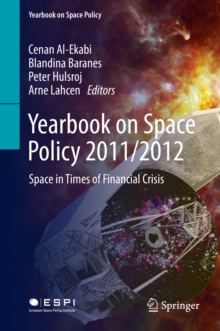
Yearbook on Space Policy 2006/2007 : New Impetus for Europe Hardback
Edited by Kai-Uwe Schrogl, Charlotte Mathieu, Nicolas Peter
Part of the Yearbook on Space Policy series
Hardback
Description
Spacepolicyisanissueareaofparticularstrategicrelevance.
Itreceivesaconstantly growingattentionbynationalgovernmentsandtheEuropeanUnion.
Ittouches numerousimportantareaslikesecurity,science,technology,knowledge,infor- tion,mobility,environmentorresourcemanagement,tonameonlyafew.
Through this,spacepolicydrawsfrombutalsodrivesthemostdecisiveaspectsofmodern society.
Anillustrationforthisstatementcanbegivenwithabrieflookonrecent developmentsinspacepolicy.
InparticulartheadoptionoftheEuropeanSpace PolicyinMay2007,whichhadbeenjointlypreparedbytheEuropeanSpaceAgency andtheEuropeanCommission,doeshaveatremendousimpactonareasbene?ting fromspaceapplications,likeclimateresearch,disastermanagementorresource management.
TheEuropeanSpacePolicywillalsopushareaslikenavigationor telecommunications,whichareattheheartoftheknowledgesocietyandtheme- issueofmobility.
Atthesametime,securityinallitsfacetsisgrowinglydependingon theuseofspacecapabilitiesandspacepolicymakinghasstartedtore?ectthis.
Onthe globallevel,theinitiativesforroboticandhumanspaceexplorationgainmoreand moreprominenceandwithactorslikeChina,arenaissanceofspaceasastrategictool forinternationalprestigeandin?uencecanbeobserved. Thecharacterofspacepolicyandthedynamisminthis?eldanditsrelatedareas makeitappropriateandevennecessarytosurveythis?eldonacontinuousbasiswith ahighstandard.
ThisreasoningwasthebasisfortheinitiativebytheEuropeanSpace PolicyInstitute(ESPI)topreparetheYearbookonSpacePolicy.
TheYearbookis intended to become the reference publication for the analysis of space policy developments.
ThescopeisglobalbuttheperspectiveisEuropean. Thiscoincides withESPI?smissiontobethefocalpointforEuropeanresearchinthe?eldofspace policyasprovidedforbythedecisionoftheCounciloftheEuropeanSpaceAgency tofoundESPI.
Asathinktank,ESPIhastoprovideinformationandanalysisandto contributefacilitating the decision-making process.
The Yearbook isaimed to becomea?agshipinESPI?sproductlineapproachingthisgoal.
Theaspirationis thattheYearbookonSpacePolicymaygainthestatureofcomparableyearbooksin internationalrelationsbyleadingthinktanksaroundtheworld.
TheYearbookonSpacePolicyhasanumberofspeci?cfeatures.
Thereporting periodwillusuallybefromJulytoJune,leadingtoitspublicationinthebeginningof thefollowingyear.
Forthis?rstedition,thereportingperiodwassettostartearlier (from1January2006)butstopatthetypicaldate(30June2007). Thisservesthe purposetocoverthewholeyear2006. TheYearbookwillhavethreeparts. The?rst partispreparedbyESPIandprovidesasystematicanalysisofthemainspace v Preface activitiesintheglobalpoliticalcontext.
Itcontainsapresentationofthemajor developmentsinspacepolicies,programmesandtechnologiesaroundtheworld.
In thesecondpart,usuallyaroundtenprominentresearcherscontributearticlesto speci?ctopicsofparticularrelevance.
Inthiseditiontheyarerelatedtoinitiativesand decisionsinEuropeanspacepolicies -asindicatedinthisyear?smottoofthe Yearbook-Spacepolicyisanissueareaofparticularstrategicrelevance.
Itreceivesaconstantly growingattentionbynationalgovernmentsandtheEuropeanUnion.
Ittouches numerousimportantareaslikesecurity,science,technology,knowledge,infor- tion,mobility,environmentorresourcemanagement,tonameonlyafew.
Through this,spacepolicydrawsfrombutalsodrivesthemostdecisiveaspectsofmodern society.
Anillustrationforthisstatementcanbegivenwithabrieflookonrecent developmentsinspacepolicy.
InparticulartheadoptionoftheEuropeanSpace PolicyinMay2007,whichhadbeenjointlypreparedbytheEuropeanSpaceAgency andtheEuropeanCommission,doeshaveatremendousimpactonareasbene?ting fromspaceapplications,likeclimateresearch,disastermanagementorresource management. TheEuropeanSpacePolicywillalsopushareaslikenavigationor telecommunications,whichareattheheartoftheknowledgesocietyandtheme- issueofmobility.
Atthesametime,securityinallitsfacetsisgrowinglydependingon theuseofspacecapabilitiesandspacepolicymakinghasstartedtore?ectthis.
Onthe globallevel,theinitiativesforroboticandhumanspaceexplorationgainmoreand moreprominenceandwithactorslikeChina,arenaissanceofspaceasastrategictool forinternationalprestigeandin?uencecanbeobserved.
Thecharacterofspacepolicyandthedynamisminthis?eldanditsrelatedareas makeitappropriateandevennecessarytosurveythis?eldonacontinuousbasiswith ahighstandard.
ThisreasoningwasthebasisfortheinitiativebytheEuropeanSpace PolicyInstitute(ESPI)topreparetheYearbookonSpacePolicy.
TheYearbookis intended to become the reference publication for the analysis of space policy developments.
ThescopeisglobalbuttheperspectiveisEuropean. Thiscoincides withESPI?smissiontobethefocalpointforEuropeanresearchinthe?eldofspace policyasprovidedforbythedecisionoftheCounciloftheEuropeanSpaceAgency tofoundESPI.
Asathinktank,ESPIhastoprovideinformationandanalysisandto contributefacilitating the decision-making process.
The Yearbook isaimed to becomea?agshipinESPI?sproductlineapproachingthisgoal.
Theaspirationis thattheYearbookonSpacePolicymaygainthestatureofcomparableyearbooksin internationalrelationsbyleadingthinktanksaroundtheworld.
TheYearbookonSpacePolicyhasanumberofspeci?cfeatures.
Thereporting periodwillusuallybefromJulytoJune,leadingtoitspublicationinthebeginningof thefollowingyear.
Forthis?rstedition,thereportingperiodwassettostartearlier (from1January2006)butstopatthetypicaldate(30June2007).
Thisservesthe purposetocoverthewholeyear2006. TheYearbookwillhavethreeparts. The?rst partispreparedbyESPIandprovidesasystematicanalysisofthemainspace v Preface activitiesintheglobalpoliticalcontext.
Itcontainsapresentationofthemajor developmentsinspacepolicies,programmesandtechnologiesaroundtheworld.
In thesecondpart,usuallyaroundtenprominentresearcherscontributearticlesto speci?ctopicsofparticularrelevance.
Inthiseditiontheyarerelatedtoinitiativesand decisionsinEuropeanspacepolicies -asindicatedinthisyear?smottoofthe Yearbook-butalsoglobalissuesliketherecentChineseantisatellitetestorthenew Japanesespaceregulation.
ThethirdpartoftheYearbook,againpreparedbyESPI, contains a unique compilation of important facts and ?gures. It includes achronology,anoverviewonspaceactivitiesinselectedcountriesandabibliography.
TheprojectofacomprehensiveYearbookrequiresthecooperationofthewhole community.
ThisiswhyESPI?sworkforthispublicationiscomplementedbythe contributionsofexternalauthorsprovidingtheirexceptionalinsightsandexperiences.
ThesecontributorsfromalloverEuropearetheleadingacademicexpertsmainlybased inthinktanksanduniversityinstituteswhilesomearealsoassociatedwithspace agenciesorworkinindustryorresearchanddevelopment.
Theyarepartofthe EuropeanSpacePolicyResearchandAcademicNetwork(ESPRAN)coordinatedby ESPI.
ItisimportanttomentionthatalsoexpertsfromoutsideEuropecanbepartof thisnetwork.
ThisishighlightedbythecontributionofJohnLogsdon(George WashingtonUniversity,WashingtonDC),oneofthedoyensinspacepolicyresearch.
InvolvedinthisendeavourisalsoanEditorialAdvisoryBoard,composedofthe membersofESPI?sAdvisoryCouncil.
Allthisaimsatsecuringtheacademicqualityof theYearbookanditsaimtobecomearelevantsourceofinformationandanalysis.
AnimportantelementofthesuccessofsuchaninitiativelikethisYearbookisthe mediumofitspresentation.
ESPIisextremelypleasedthatSpringerWienNewYork wasfromtheoutsetverymuchinterestedinthisproject. Throughtheexcellent collaborationwithSpringer?sSilviaSchilgeriusthechallengesofa?rsteditionfor suchaYearbookseriesweremasteredwithgreatease.
CooperationbetweenESPI andSpringerWienNewYorkisintendedtointensifyfurtherwithadedicatedbook seriesonspacepolicy.
TheseperspectiveswereadditionalmotivationforESPI?s editorialteamforthis?rsteditionoftheYearbook,whereNicolasPeterauthored Part1,CharlotteMathieueditedPart2andCharlotteMathieuandBlandina BaranespreparedPart3.
Valuablecontributionsandsupportwereprovidedinthe earlyplanningphasebySergePlattardandintheeditorialphasebyPierre-Henri Pisani,JulieAbouYehiaandTimSkurbaty.
Itiswithgreatcon?dencethatwebring this Yearbook to the attention of decision makers, professionals in industry, researchandsciencedealingwithspaceactivitiesandinternationalrelationsand alsotothebroaderpublic,whichintendstounderstandthepoliciesbehindoneof themostimportantandfascinatingprovincesofmodernsociety:space!
Kai-UweSchrogl,CharlotteMathieu,NicolasPeter ESPIeditorialteam vi Tableofcontents Tableofcontents Listofacronyms...xiv Listof?guresandtables ...xxii PART1 TheYearinSpace2006/2007 Chapter1.
Europeanspaceactivitiesintheglobal context. NicolasPeter 1. Geopoliticaltrends ...2 1. 1. Globaleconomicoutlook ...2 1. 2. Politicaldevelopmentsin2006/2007...3 1. 2. 1. Europe ...3 1. 2. 2. UnitedStates...4 1. 2. 3. Russia...5 1. 2. 4. Japan...5 1. 2. 5. China...6 1. 2. 6. India...7 1. 3. Internationalsecurity...7 1. 4. Majorhighlightsinscienti?cactivitiesandresearch ...8 1. 5. Mainscienceandtechnologyindicators relevanttospace activities...11 1. 5. 1. Scienceandtechnologyinputs ...11 1. 5. 2. Scienceandtechnologyoutputs...13 2. Worldwidespacepoliciesandstrategies ...16 2. 1. TheUnitedNationssystem...16 2. 1. 1. UnitedNationsGeneralAssemblycommittees...18 2. 1. 2. OtherUnitedNationsbodiesandorgans...
Information
-
Item not Available
- Format:Hardback
- Pages:330 pages, XXV, 330 p.
- Publisher:Springer Verlag GmbH
- Publication Date:03/07/2008
- Category:
- ISBN:9783211789223
Information
-
Item not Available
- Format:Hardback
- Pages:330 pages, XXV, 330 p.
- Publisher:Springer Verlag GmbH
- Publication Date:03/07/2008
- Category:
- ISBN:9783211789223










